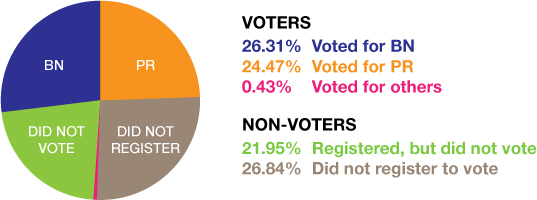How legitimate is our elected government?

IF rumour holds true, the 13th general election, due by March 2013, will be held sometime this year. Once again, Malaysians will cast their votes and the party that wins the most number of parliamentary seats will govern federally.
But how legitimate is the government that eventually gets into power? Does the party in power actually have the support of a majority of Malaysians? And if not, what can be done to make our democracy better?
8 March results
Let’s look at Malaysia’s 12th general election, held on 8 March 2008. Of the 10.9 million registered voters, about 70% cast their ballots. Barisan Nasional (BN) won 51.39% of those votes and took 140 out of 222 parliamentary seats. Pakatan Rakyat (PR) took 47.79% of the votes and 82 parliamentary seats.
However, about 30% of the 10.9 million registered voters did not vote. If we take them into account, BN only has the support of 35.97% of all registered voters, and PR 33.45%.
If we include the approximately four million Malaysians of voting age who did not register to vote, BN’s actual support drops to only 26.31%. PR’s support would be only 24.47%.

Statistics from the 2008 general election — both coalitions had less votes each than the number of eligible voters who did not even register
What does this say of the legitimacy of the BN government’s right to wield political power? Indeed, the number of Malaysians who did not register to vote constitutes 26.84% of all those eligible to vote. So each of the two political coalitions won less popular support than the total number of Malaysians aged 21 and above who did not register to vote.
DBKL representation

Datuk Bandar of Kuala Lumpur Tan Sri Ahmad Fuad Ismail (source: dbkl.gov.my)
The running of the Federal Territory of Kuala Lumpur is a good example of where the legitimacy of government can be questioned. Although PR won 10 out of 11 parliamentary seats in Kuala Lumpur, no PR representative sits on Dewan Bandaraya Kuala Lumpur’s (DBKL) advisory board. This board has been appointed by the federal government since the city of Kuala Lumpur was established in 1972.
None of the present 13 advisory board members has any popular mandate from the people of Kuala Lumpur to advise the Datuk Bandar in running the city’s administration. For that matter, neither does the Datuk Bandar, as he is also a federal government appointee.

Tian Chua
Datuk Lim Si Pin of Gerakan is the only advisory board member who contested in Kuala Lumpur in the 2008 elections. He obtained 20,330 votes in the Batu seat, where he lost to Parti Keadilan Rakyat’s Tian Chua. This constitutes 4.08% of total votes cast throughout Kuala Lumpur. With only the support of 4.08% of Kuala Lumpur, Lim is nonetheless able to exert influence on the governance of Kuala Lumpur citizens in a way that none of the elected PR representatives can.
Overall, of the 497,741 votes successfully[1] cast for all candidates in the 11 Kuala Lumpurparliamentary constituencies, PR obtained 308,377 while BN secured 188,875. In terms of percentage, PR gained the support of about 62% of voting KL-ites as opposed to BN’s 38%.

